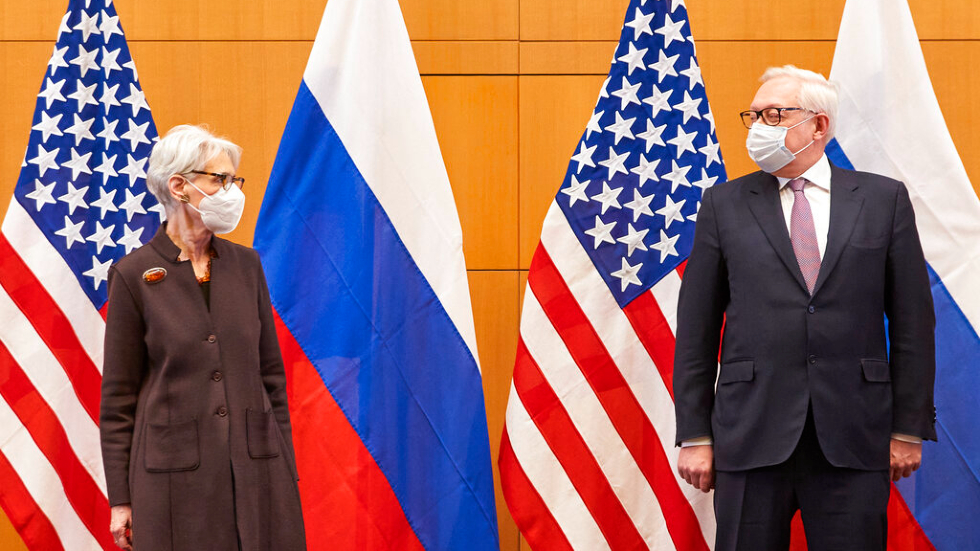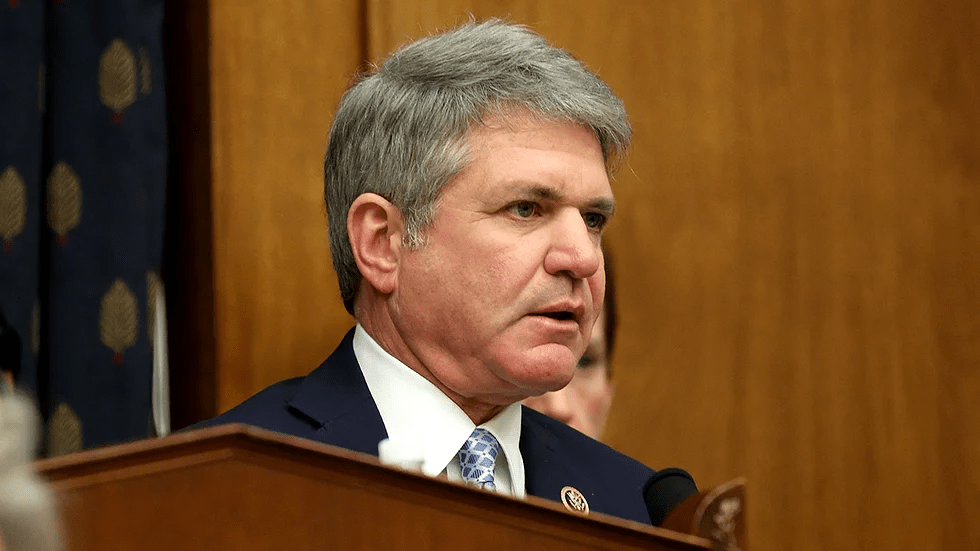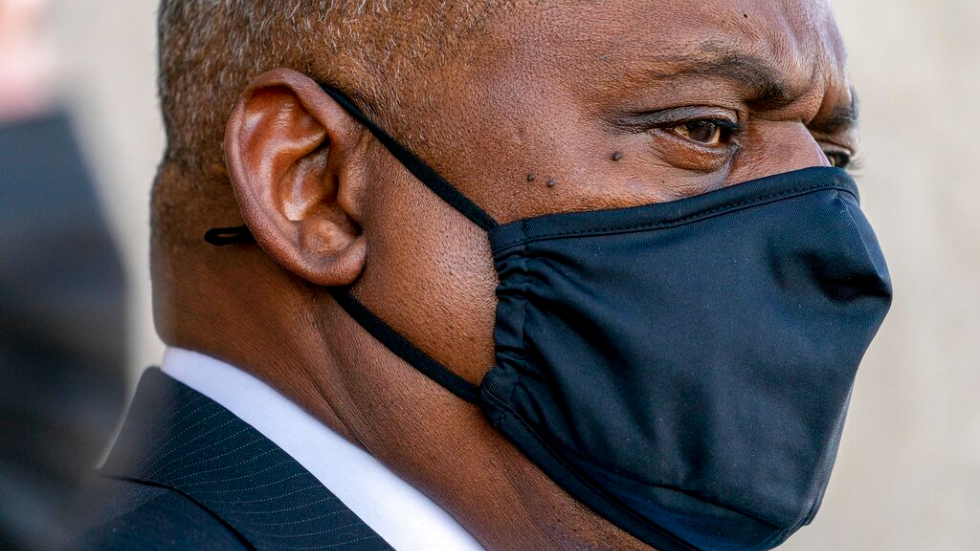Overnight Defense & National Security — US, Russia have face-to-face sit down

It’s Monday, welcome to Overnight Defense & National Security, your nightly guide to the latest developments at the Pentagon, on Capitol Hill and beyond. Subscribe here: digital-release.thehill.com/newsletter-signup.
U.S. and Russian officials sat down for the first of a series of negotiating sessions planned for this week.
More on how it went and what’s next, plus the details on the new House legislation targeting Russia over its military buildup near Ukraine and how the National Guard is helping states battle COVID-19.
For The Hill, I’m Ellen Mitchell. Write me with tips at emitchell@digital-release.thehill.com.
Let’s get to it.
US, Russia have ‘better understanding’

Deputy Secretary of State Wendy Sherman on Monday said the U.S. and Russia have a better understanding of each other’s concerns and priorities following a meeting between the two sides in Geneva triggered by Moscow’s military buildup on Ukraine’s border.
Sherman, the No. 2 diplomat at the State Department, spoke with reporters after the conclusion of eight hours of talks with Russian officials.
“The United States came to today’s extraordinary meeting prepared to hear Russia’s security concerns and to share our own,” she said.
“Today was a discussion, a better understanding of each other and each other’s priorities and concerns.”
Meeting details: The Geneva meeting, which took place under the framework of the Strategic Stability Dialogue, was scheduled in response to Russia’s massing of more than 100,000 troops on the border of Ukraine and calls for the U.S. and the North Atlantic Treaty Organization (NATO) to agree to Moscow’s security demands — published in the form of two draft treaties.
The Strategic Stability Dialogue was first agreed to in June by President Biden and Russian President Vladimir Putin as a forum for Washington and Moscow to directly address security concerns and possible solutions. This week’s discussion is the third meeting for the group, which previously met in July and September.
US STRESSES DIPLOMACY
U.S. officials have balked at Russia’s effort to force treaty ultimatums with the threat of military force, reinforcing diplomacy as the only way forward and raising possible areas of cooperation.
“If Russia stays at the table and takes concrete steps to deescalate tensions, we believe we can achieve progress,” Sherman said. She reiterated potential actions that the U.S. and allies are prepared to take if Russia launches an invasion.
Sherman also said the U.S. proposed ideas where the two countries could take “reciprocal action” that would have a shared security interest, including discussions about “reciprocal limits” on the size and scope of military exercises in Europe and to “improve transparency” around those exercises.
US says it’s open to discuss missile systems: Sherman also said the U.S. told Russia that it is open to discussing the future of certain missile systems in Europe related to the former Intermediate-Range Nuclear Forces (INF) Treaty, which former President Trump withdrew from in 2018 following Russian violations.
“The Russians addressed the concerns that we had that led to the ultimate demise of the INF Treaty,” Sherman said.
What’s next: Monday’s talks are the first of three meetings taking place in Europe this week between Russian officials and the U.S. and its allies and partners in Europe. The talks are intended to stave off the possibility of Russia launching a war against Ukraine.
Sherman will next travel to Brussels to brief NATO allies on the bilateral talks with Russia, ahead of a meeting of the Russia-NATO council on Wednesday, and a meeting of the Organization for Security and Cooperation in Europe on Thursday.
House Republicans unveil bill targeting Russia

House Republicans introduced legislation on Monday targeting Russia over its military buildup near Ukraine as officials from Washington and Moscow meet to discuss the Kremlin’s security demands.
The Guaranteeing Ukrainian Autonomy by Reinforcing its Defense Act, or GUARD Act, would move to bolster Kyiv’s defense capabilities and reject some of Russia’s demands.
Timing: President Biden has faced bipartisan calls to take a tougher stance on Russia amid its military posturing, and Republicans have criticized the president for what they call a weak response to the Kremlin.
“This legislation firmly rejects this pattern of weakness that has dangerously emboldened Putin by immediately providing Ukraine with the support it needs to ensure the Kremlin understands a further invasion of Ukraine would come at a terrible cost,” Rep. Michael McCaul (R-Texas), ranking member of the House Foreign Affairs Committee, said in a statement.
Long-shot legislation: The legislation, which is not likely to become law, comes as Russia has amassed more than 100,000 troops near its border with Ukraine — sparking fears among U.S. and European allies that Moscow may be plotting an invasion like when it annexed the Crimean Peninsula in 2014.
Moscow has denied such accusations and is demanding among other things that the U.S. and NATO deny Ukraine membership and roll back military deployments.
What the bill would do: The legislation would provide $200 million to bolster Ukraine’s air defense and naval capacities to counter Russian aggression. The U.S. provided $450 million to the country for military assistance in 2021 alone and about $2.5 billion since 2014.
Further, the legislation would impose sanctions on the Nord Stream 2 pipeline within 15 days of its enactment and allow Congress an option to veto a wider range of Russian-related sanctions, including the pipeline.
STATES TURN TO NATIONAL GUARD FOR HELP
Several states are turning to their National Guards for help as they see spikes in demand for coronavirus testing and other pandemic needs during the omicron surge.
Governors have been deploying their guards since the pandemic began to help with a variety of needs. But over the past year, the spread of the delta and omicron variants has spurred the need for backup personnel.
Growing numbers: On Jan. 3, Ohio Gov. Mike DeWine (R) announced that about 300 members of his state’s National Guard will support state testing efforts in nine new cities. A week earlier he had mobilized an additional 1,250 members to support hospitals that critically needed the help.
Overall, over 2,300 members of the state’s National Guard are working with Ohio’s health care systems.
More states mobilize: Over the past week, several other states, including Minnesota and Rhode Island, also announced they would mobilize the National Guard to support testing capacity.
California Gov. Gavin Newsom (D) on Friday announced he’s mobilizing 200 members of the California National Guard to support testing facilities amid the omicron surge.
The deployments come as the U.S. sees a rapid spike in COVID-19 infections largely fueled by the omicron variant, which was first detected in South Africa on Nov. 14.
ICYMI: VAX MANDATE FIGHT RAGES
The Pentagon won its first battle over its vaccine mandate for the National Guard, but a broader fight over the mandate is raging as multiple states seek to exert their authority.
A federal judge in late December rejected a bid from Oklahoma Gov. Kevin Stitt (R) to preliminarily block the mandate. However, the state still has options, and Texas Gov. Greg Abbott (R) is waging his own legal battle over the mandate a week after Oklahoma’s loss.
States and the federal government have dual control over the National Guard. While governors typically call out the guard to help with emergencies and national disasters, the federal government can also activate it, though such circumstances are rare.
The issue in question: The dispute over the Pentagon’s mandate revolves around that question of authority over the National Guard, with courts now dragged into the middle of the fight. As it plays out, Army guard members have until late June to comply with the mandate or face consequences.
“I don’t believe there has ever been this level of conflict between Guard units and the federal government in our history,” said Sean Timmons, a Houston-based lawyer at the firm Tully Rinckey PLLC.
Arguing on behalf of state authority, Stitt and Abbott maintain they control the guard when it operates under Title 32 of the U.S. Code. But under Title 10, the president can mobilize the guard, which places them under federal authority.
The Pentagon has largely stayed quiet about the lawsuits it faces over the vaccine mandate for the National Guard and other military services. But as it relates to the guard, officials have been clear that the mandate applies to troops regardless of duty status.
Austin returns to Pentagon

Defense Secretary Lloyd Austin was back in the Pentagon on Monday after testing negative for COVID-19 over the weekend.
In a statement released Sunday evening, press secretary John Kirby said Austin is “grateful for the efficacy” of the coronavirus vaccines he had received, which “rendered much less severe the effects of the virus.”
Austin will continue to observe both the CDC and Pentagon’s COVID-19 guidelines and will mask, social distance, Kirby added.
No other senior leaders have been known to have contracted the virus at this time.
Austin announced Jan. 2 that he had tested positive for COVID-19 while at home on leave and planned to quarantine there.
ON TAP FOR TOMORROW
- The House Appropriations Committee will hold a hearing on “Security of the Capitol Campus Since the Attack of January 6, 2021,” at 10 a.m.
- The House Oversight and Reform Committee will hold a hearing on “Cybersecurity for the New Frontier: Reforming the Federal Information Security Modernization Act,” at 10 a.m.
- The Senate Judiciary Committee will hold a hearing on “The Domestic Terrorism Threat One Year After January 6,” at 10 a.m.
- Secretary of State Antony Blinken and Defense Secretary Lloyd Austin will provide testimony at a closed hearing of the Senate Foreign Relations and Armed Services committee on “U.S. Policy on Afghanistan,” at 10 a.m.
- A House Armed Services subcommittee will hold a hearing on “Red Hill Bulk Fuel Storage Facility: The Current Crisis, the Response, and the Way Forward,” with testimony from Vice Adm. Yancy Lindsey, commander, Navy Installations Command; and Rear Adm. Blake Converse, deputy commander, U.S. Pacific Fleet; among other Defense officials, at 10 a.m.
- New America will host a virtual discussion on “Guantanamo at Twenty: What is the Future of the Prison Camp?” at 10:30 a.m.
- Government Executive Media Group will host a virtual discussion on “Evolving at the Pace of Cyber Threats,” at 2 p.m.
WHAT WE’RE READING
- Biden raises concerns over airstrikes in call with Ethiopian leader
- Putin says Kazakhstan saved from foreign-backed uprising
- Australia agrees to $3.5 billion tank deal with US: report
- US troops’ movement limited in Japan to prevent COVID-19 spread
- Baby handed to soldier during Afghanistan evacuation reunited with family: report
- Five things to know as US, Russia seek Ukraine solution
- Military Times: He won $346m in contracts meant for vets and minorities. He was neither
- The Associated Press: Marine officer blames bad information for sinking tragedy
That’s it for today! Check out The Hill’s defense and national security pages for latest coverage. We’ll see you on Tuesday.
Copyright 2023 Nexstar Media Inc. All rights reserved. This material may not be published, broadcast, rewritten, or redistributed.

